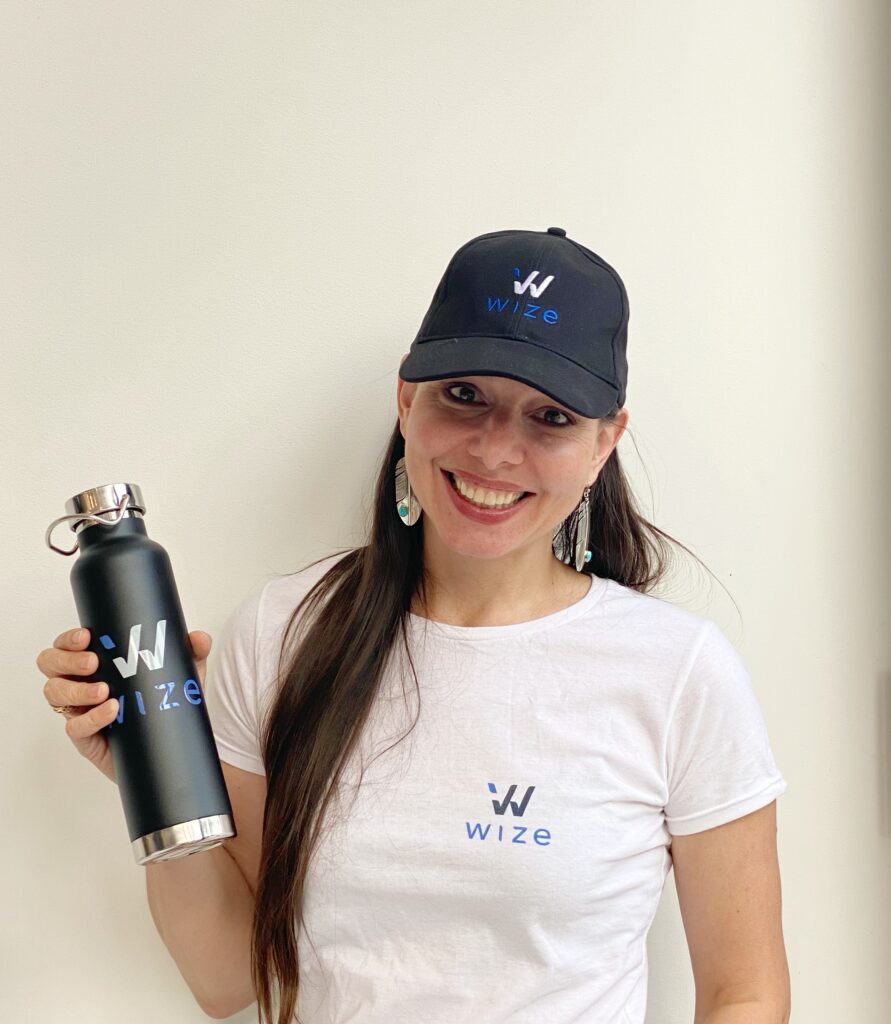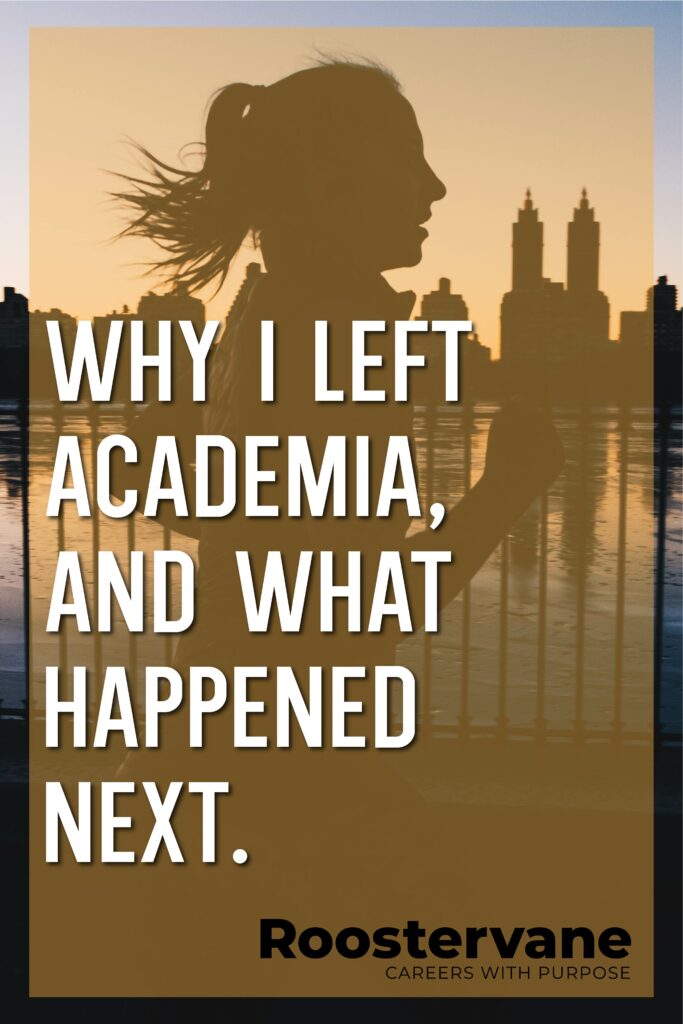I first met Lindy Ledohowski, PhD for lunch at an Ottawa Bier Markt in Fall of 2019. I’d recently started blogging about leaving academia, and we connected on LinkedIn.
I was still working for the government in a glass tower somewhere downtown, puzzling over the sad fate of PhDs in the academy (and that was before the pandemic).
She had recently moved to the city, and introduced herself as a former English prof who left academia and now runs an ed tech startup. I was immediately fascinated by her story, not to mention excited by the ability to talk entrepreneurship with a fellow humanities grad–something that doesn’t happen often.
Although that remains the only time we’ve ever met in person, thanks to the pandemic, I’ve chatted with Lindy several times over the past two years, and featured her amazing story on Roostervane (read/watch it if you never have).
I would always talk about Lindy as “the former English prof who started an ed tech company,” which fascinated people. But as I was soaking up the summer on Manitoulin Island, I got a note from Lindy that she’s sold the company (I now call her “the former English prof who sold her first company.”) Her startup, EssayJack, which helped students write better essays, was acquired by Wize, a Canadian test prep and tutoring company.
I reconnected with Lindy to get an update on her story, and find out what the experience taught her.
1. Launching Essay Jack
Chris: We’ve featured your story before, but for those who haven’t heard it yet, what was it that prompted you to leave academia and eventually start a company?
Lindy: Great question! I loved being an English professor – or at least I loved a number of things about it, including the love of literature and the discipline of literary analysis and teaching students – but I didn’t love being fixed in one place for the rest of my life.
The lack of mobility in permanent professorial positions was tough, and so at first it was that flexibility and mobility that I was looking to create in starting a business.
I also knew that after building a career as a scholar, I knew that I could do many things outside the academy, but I knew that in order to showcase those skills and abilities to an employer, I needed to demonstrate them first – and, so, voila! I started a business!
2. Building a company
So what was the best thing about building the company? What brought you the most joy?
In building EssayJack the most important and most joyful component was developing the software.
Trying to figure out how to implement real writing pedagogy into a responsive web app that wasn’t a gimmick but really helped students with their writing tasks and English scholarship was perhaps the most exciting part about building that business.
In a way it was taking many of the theoretical principles that were core to my teaching practice and making them concrete in software; it was both creative and academic, and I enjoyed that part!
3. Daily life of a founder
What does the daily life of an ed-tech CEO look like? How was it different from your life as a prof?
Oh my gosh! I’d be listing forever if I listed all the ways in which it is different to be a CEO rather than to be a professor.
One thing that I think is important to pull out is the difference in accountability. As a professor, I certainly had expectations in terms of the quality of my teaching and my publications, and certainly I met and exceeded those expectations, but there aren’t specific financial KPIs as a professor. As a professor, you are largely disconnected from the larger financial machine of the university as a whole. Even departmental budgets and decision-making is relatively limited in the grand scope of the organization.
As an EdTech CEO every single decision is linked to finances – paying for software development, doing bookkeeping, running experiments with ads, building sales and marketing collateral, deciding on the success/failure of partnerships, raising funds, etc. are all profoundly financial in nature, which is entirely different from the English literary life of the mind that focuses on a scholarly discipline!
4. Selling the company
Congrats on selling the company! It’s a really amazing story, and it’s so cool that you had an exit. How did that come about?
When you start a company, you generally think about three ultimate outcomes:
1. Making the company revenue positive so that you can just continue running the company forever.
2. Getting investment funding from VCs to ultimately drive growth and achieve IPO status going public.
3. Exiting to a larger company.
For me, I knew that I didn’t want #1, partially because tech is something that is forever changing and moving, and getting to a growth and positive revenue stage would continue to take more capital than we privately had to put into it and partly because I don’t want to do ANYTHING forever and ever. If I had wanted that, I might have stayed being a professor!
But I was very set on #2 and raising VC funding to get us to the next stage of the business where we’d then be able to grow out our team and expand our offerings. What was funny in the investment conversations that I was having was that a lot of the investors said something like “EssayJack is great, but it’s too niche; it’s only writing.”
While I was getting that messaging from investors, I started having conversations with a few larger EdTech companies who were interested in acquiring us. That way, instead of using investment money to grow out our team, we’d join a team that already existed, and instead of being “too niche,” we’d join forces with a company with a larger offering.
So while that was happening, I had actually met Cyrus Moradian, the CEO and Cofounder of Wize through LinkedIn as a fellow Canadian EdTech startup CEO, and I asked him about what he thought about companies talking to me about acquisitions, and he said “well, if you’re thinking about that seriously, let’s talk!”
And it turned out that Wize was looking to expand its offerings into English, and so we had a very good strategic alignment, and once we started due diligence, we realized both our tech stacks were built similarly and our vision for making education accessible and affordable for all in pedagogically-sound, online offerings was very aligned.
5. Advice for would-be founders
What advice would you give to someone wanting to found a start-up? Especially with a view to an exit?
So in starting a startup – be it a tech company or another budding enterprise – there are a few key things you have to know when thinking about the exits.
First, you must know what exit you want of the three I list above. Second, once you know what you want, you have to figure out whether or not your business idea has what it takes to get to the exit you’re looking for.
For example, not all tech companies are a good fit for venture capital. Venture-backed businesses have to meet a number of criteria, and not all startups will ever meet those. Or for another example, if you want to run your company as a revenue-generating engine for ever, at what point will you try to sell it off? Who would want your company?
There are ways to position yourself and your company to get the best outcome.
So while you can’t know all the twists and turns that your startup might take you on when you begin, you should have a general idea of where you want to go with it so that you can have eyes open for opportunities as and when they arrive.
6. Advice for entrepreneurial students
Any advice for current students who are entrepreneurial at heart but don’t know where to start? Are there some foundations they could be building now?
The most important thing is networking. I know that everyone says this, but literally, I sold my business during a pandemic to people I’ve still never met in person, all through opportunities that emerged through networking.
I met Cyrus through LinkedIn, and as he worked to socialize his investors and the rest of the team to the potential acquisition, one of the things that they were able to do was track and trace both me and the company through our digital footprint.
I made the decision when we started EssayJack to use my social media platforms to be as honest and authentic as possible, so that if anyone searched me, they’d get a pretty good sense for what I’m all about, and I think that really helped everyone become comfortable with not only acquiring the company, but inviting me to join the team!
Dr Lindy Ledohowski is a Canadian literary arts expert who quit her tenure track job as an English professor and founded EdTech startup EssayJack. After leading EssayJack through year-over-year growth as its CEO for nearly six years, she saw it through the acquisition process by Wize. As part of the acquisition by Wize, Lindy joined Wize as a VP, a core member of the leadership team.







